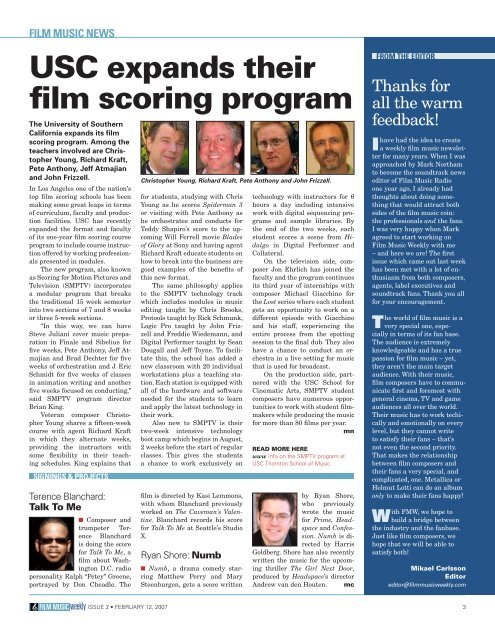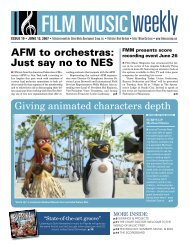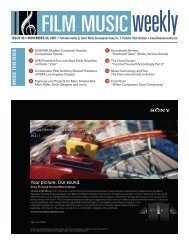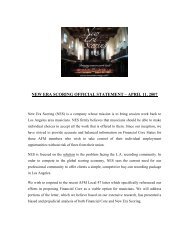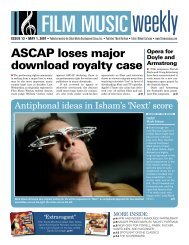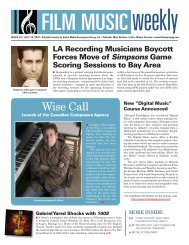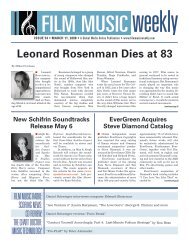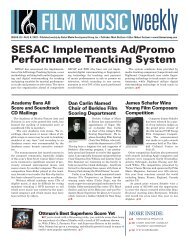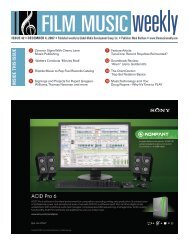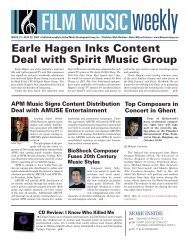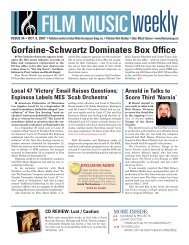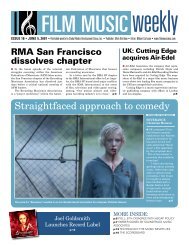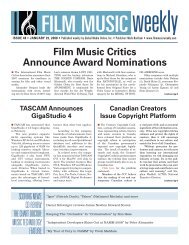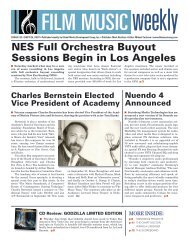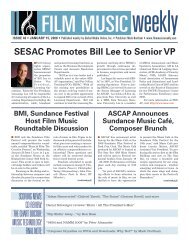February 12, 2007 - Film Music Magazine
February 12, 2007 - Film Music Magazine
February 12, 2007 - Film Music Magazine
Create successful ePaper yourself
Turn your PDF publications into a flip-book with our unique Google optimized e-Paper software.
FILM MUSIC NEWS<br />
USC expands their<br />
film scoring program<br />
The University of Southern<br />
California expands its film<br />
scoring program. Among the<br />
teachers involved are Christopher<br />
Young, Richard Kraft,<br />
Pete Anthony, Jeff Atmajian<br />
and John Frizzell.<br />
In Los Angeles one of the nation’s<br />
top film scoring schools has been<br />
making some great leaps in terms<br />
of curriculum, faculty and production<br />
facilities. USC has recently<br />
expanded the format and faculty<br />
of its one-year film scoring course<br />
program to include course instruction<br />
offered by working professionals<br />
presented in modules.<br />
The new program, also known<br />
as Scoring for Motion Pictures and<br />
Television (SMPTV) incorporates<br />
a modular program that breaks<br />
the traditional 15 week semester<br />
into two sections of 7 and 8 weeks<br />
or three 5-week sections.<br />
“In this way, we can have<br />
Steve Juliani cover music preparation<br />
in Finale and Sibelius for<br />
five weeks, Pete Anthony, Jeff Atmajian<br />
and Brad Dechter for five<br />
weeks of orchestration and J. Eric<br />
Schmidt for five weeks of classes<br />
in animation writing and another<br />
five weeks focused on conducting,”<br />
said SMPTV program director<br />
Brian King.<br />
Veteran composer Christopher<br />
Young shares a fifteen-week<br />
course with agent Richard Kraft<br />
in which they alternate weeks,<br />
providing the instructors with<br />
some flexibility in their teaching<br />
schedules. King explains that<br />
SIGNINGS & PROJECTS<br />
Terence Blanchard:<br />
Talk To Me<br />
n Composer and<br />
trumpeter Terence<br />
Blanchard<br />
is doing the score<br />
for Talk To Me, a<br />
film about Washington<br />
D.C. radio<br />
personality Ralph “Petey” Greene,<br />
portrayed by Don Cheadle. The<br />
Christopher Young, Richard Kraft, Pete Anthony and John Frizzell.<br />
for students, studying with Chris<br />
Young as he scores Spiderman 3<br />
or visiting with Pete Anthony as<br />
he orchestrates and conducts for<br />
Teddy Shapiro’s score to the upcoming<br />
Will Ferrell movie Blades<br />
of Glory at Sony and having agent<br />
Richard Kraft educate students on<br />
how to break into the business are<br />
good examples of the benefits of<br />
this new format.<br />
The same philosophy applies<br />
to the SMPTV technology track<br />
which includes modules in music<br />
editing taught by Chris Brooks,<br />
Protools taught by Rick Schmunk,<br />
Logic Pro taught by John Frizzell<br />
and Freddie Wiedemann, and<br />
Digital Performer taught by Sean<br />
Dougall and Jeff Toyne. To facilitate<br />
this, the school has added a<br />
new classroom with 20 individual<br />
workstations plus a teaching station.<br />
Each station is equipped with<br />
all of the hardware and software<br />
needed for the students to learn<br />
and apply the latest technology in<br />
their work.<br />
Also new to SMPTV is their<br />
two-week intensive technology<br />
boot camp which begins in August,<br />
2 weeks before the start of regular<br />
classes. This gives the students<br />
a chance to work exclusively on<br />
film is directed by Kasi Lemmons,<br />
with whom Blanchard previously<br />
worked on The Caveman’s Valentine.<br />
Blanchard records his score<br />
for Talk To Me at Seattle’s Studio<br />
X.<br />
Ryan Shore: Numb<br />
n Numb, a drama comedy starring<br />
Matthew Perry and Mary<br />
Steenburgen, gets a score written<br />
technology with instructors for 6<br />
hours a day including intensive<br />
work with digital sequencing programs<br />
and sample libraries. By<br />
the end of the two weeks, each<br />
student scores a scene from Hidalgo<br />
in Digital Performer and<br />
Collateral.<br />
On the television side, composer<br />
Jon Ehrlich has joined the<br />
faculty and the program continues<br />
its third year of internships with<br />
composer Michael Giacchino for<br />
the Lost series where each student<br />
gets an opportunity to work on a<br />
different episode with Giacchino<br />
and his staff, experiencing the<br />
entire process from the spotting<br />
session to the final dub. They also<br />
have a chance to conduct an orchestra<br />
in a live setting for music<br />
that is used for broadcast.<br />
On the production side, partnered<br />
with the USC School for<br />
Cinematic Arts, SMPTV student<br />
composers have numerous opportunities<br />
to work with student filmmakers<br />
while producing the music<br />
for more than 80 films per year.<br />
mn<br />
READ MORE HERE<br />
www Info on the SMPTV program at<br />
USC Thornton School of <strong>Music</strong><br />
by Ryan Shore,<br />
who previously<br />
wrote the music<br />
for Prime, Headspace<br />
and Confession.<br />
Numb is directed<br />
by Harris<br />
Goldberg. Shore has also recently<br />
written the music for the upcoming<br />
thriller The Girl Next Door,<br />
produced by Headspace’s director<br />
Andrew van den Houten. mc<br />
FROM THE EDITOR<br />
Thanks for<br />
all the warm<br />
feedback!<br />
have had the idea to create<br />
I a weekly film music newsletter<br />
for many years. When I was<br />
approached by Mark Northam<br />
to become the soundtrack news<br />
editor of <strong>Film</strong> <strong>Music</strong> Radio<br />
one year ago, I already had<br />
thoughts about doing something<br />
that would attract both<br />
sides of the film music coin:<br />
the professionals and the fans.<br />
I was very happy when Mark<br />
agreed to start working on<br />
<strong>Film</strong> <strong>Music</strong> Weekly with me<br />
– and here we are! The first<br />
issue which came out last week<br />
has been met with a lot of enthusiasm<br />
from both composers,<br />
agents, label executives and<br />
soundtrack fans. Thank you all<br />
for your encouragement.<br />
The world of film music is a<br />
very special one, especially<br />
in terms of its fan base.<br />
The audience is extremely<br />
knowledgeable and has a true<br />
passion for film music – yet,<br />
they aren’t the main target<br />
audience. With their music,<br />
film composers have to communicate<br />
first and foremost with<br />
general cinema, TV and game<br />
audiences all over the world.<br />
Their music has to work techically<br />
and emotionally on every<br />
level, but they cannot write<br />
to satisfy their fans – that’s<br />
not even the second priority.<br />
That makes the relationship<br />
between film composers and<br />
their fans a very special, and<br />
complicated, one. Metallica or<br />
Helmut Lotti can do an album<br />
only to make their fans happy!<br />
With FMW, we hope to<br />
build a bridge between<br />
the industry and the fanbase.<br />
Just like film composers, we<br />
hope that we will be able to<br />
satisfy both!<br />
Mikael Carlsson<br />
Editor<br />
editor@filmmusicweekly.com<br />
FILM MUSIC weekly ISSUE 2 • FEBRUARY <strong>12</strong>, <strong>2007</strong> 3


